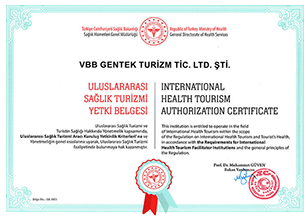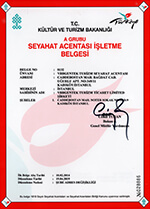Having Treatment With Stem Cell for Covid 19 is Possible
Thanks to the Stem Cell Therapy, which has been used in the treatment of many diseases for many years, success has also been achieved in the treatment of patients infected with Corona Virus.
Up to now, promising results have been expected with Plasma treatment.However, Experts stated that the Stem Cell method has a rapid healing effect even in severe cases, and also eliminates the lesions in the patient's body, leaving no traces of the disease.
While successful studies on Stem Cell Therapy is in progress, FDA approval has been obtained in the United States in order to become widespread, and the official approval process continues by the Ministry of Health in our country.
How Stem Cells Are Remedy for Coronavirus?
Stem cell therapy is able to remediate lung diseases, heart and liver diseases, autism and Alzheimer's, brain damage, skin diseases, skin rejuvenation, muscle and bone diseases, and many immune system diseases.
By means of the proven features of stem cells, such as supporting new vascular formations, preventing tissue hardening, defense against oxidants, preventing an infection reaction, preventing cell death, repairing damaged cells and tissues, regulating and strengthening the immune system, patients infected with Covid 19 can quickly become healthy.
Moreover, thanks to the restorative / regenerating feature of stem cells, there are no traces of lesions occurring especially in the lung during the disease.
It is known that stem cell sources that specialists may prefer to obtain mesenchymal stem cells are adipose tissue, bone marrow and infant cord ligament.
The crucial issue here is that it is necessary to know that stem cell reproduction and storage is not possible anywhere except for the specially equipped Stem Cell Laboratories, which are approved by the Ministry of Health and have globally valid GMP standards.
Approval to stem cell trial in Covid-19 treatment from the USA
The U.S. Food and Drug Administration (FDA) has approved the clinical trial for the treatment of new types of coronavirus (Covid-19) patients, which require the use of mesenchymal stem cells capable of transforming into other cells and regenerating themselves.
According to the news on the "Clinical Trials Arena" website, the therapy for the second stage clinical trial of Hope Biosciences, located in Texas, has been accepted.
In a clinical trial at the River Oaks Hospital in Houston, the company will perform therapy with fat-derived mesenchymal stem cells (HB-adMSCs) in 110 patients undergoing Kovid-19 therapy.
Patients will be injected with 100 million mesenchymal stem cells in 4 doses over a 10-day period.
It is aimed to heal patients without the need for a respirator
Donna Chang, the company's founder and Chairman of the Board, stated that the goal of the treatment is to improve the clinical condition of severe patients before proceeding to the intubation stage where the respirator is connected and made a remark:
"By transferring mesenchymal stem cells, we aim to resist the patient's immune system damage caused by Kovid-19 and restore the cells. If we can save patients from connecting to the respirator, we can increase their chances of survival."
The company had previously run two clinical trials to prevent the infection of the virus.
Neither an immune vaccine nor an absolutely effective drug or treatment has been found yet against Kovid-19, which has spread to more than 200 countries after emerging in China and turned into a pandemic.
Expanded Umbilical Cord Mesenchymal Stem Cells (UC-MSCs) as a Therapeutic Strategy In Managing Critically Ill COVID-19 Patients: The Case for Compassionate Use
COVID-19 has affected the United States leading to a national emergency with health care and economic impact, propelling the country into a recession with disrupted lifestyles not seen in recent history. COVID-19 is a serious illness leading to multiple deaths in various countries including the United States. Several million Americans satisfy the Center for Disease Control and Prevention (CDC) criteria for being high risk. Unfortunately, the available supply of medical beds and equipment for mechanical ventilation are much less than is projected to be needed. The World Health Organization (WHO) and multiple agencies led by the CDC in the United States have attempted to organize intensive outbreak investigation programs utilizing appropriate preventive measures, evaluation, and treatment.
The clinical spectrum of COVID-19 varies from asymptomatic forms to conditions encompassing multiorgan and systemic manifestations in terms of septic shock, and multiple organ dysfunction (MOD) syndromes. The presently approved treatments are supportive but not curative for the disease. There are multiple treatments being studied. These include vaccines, medications Remdesivir and hydroxychloroquine and potentially combination therapy. Finally, expanded umbilical cord mesenchymal stem cells or (UC-MSCs) may have a role and are being studied.
The cure of COVID-19 is essentially dependent on the patients’ own immune system. When theimmune system is over activated in an attempt to kill the virus, this can lead to the production of a large number of inflammatory factors, resulting in severe cytokine storm. The cytokine storm may induce organ damage followed by the edema, dysfunction of air exchange, acute respiratory distress syndrome (ARDS), acute cardiac injury, and secondary infection, which may lead to death. Thus, at this point, the avoidance of the cytokine storm may be the key for the treatment of HCOV-19 infected patients.
In China, where there was limited availability of effective modalities to manage COVID-19 several patients were treated with expanded UC-MSCs. Additionally, the Italian College of Anesthesia, Analgesia, Resuscitation and Intensive Care have reported guidelines to treat coronavirus patients with stem cells in the hope of decreasing the number of patients going to the ICU, and, also relatively quickly getting them out of ICU.
In this manuscript, we describe the urgent need for various solutions, pathogenesis of coronavirus and the clinical evidence for treatment of COVID-19 with stem cells. The limited but emerging evidence regarding UC MSC in managing COVID-19 suggests that it might be considered for compassionate use in critically ill patients to reduce morbidity and mortality in the United States.
Expanded Umbilical Cord Mesenchymal Stem Cells (UC-MSCs) as a Therapeutic Strategy In Managing Critically Ill COVID-19 Patients: The Case for Compassionate Use
COVID-19 has affected the United States leading to a national emergency with health care and economic impact, propelling the country into a recession with disrupted lifestyles not seen in recent history. COVID-19 is a serious illness leading to multiple deaths in various countries including the United States. Several million Americans satisfy the Center for Disease Control and Prevention (CDC) criteria for being high risk. Unfortunately, the available supply of medical beds and equipment for mechanical ventilation are much less than is projected to be needed. The World Health Organization (WHO) and multiple agencies led by the CDC in the United States have attempted to organize intensive outbreak investigation programs utilizing appropriate preventive measures, evaluation, and treatment.
The clinical spectrum of COVID-19 varies from asymptomatic forms to conditions encompassing multiorgan and systemic manifestations in terms of septic shock, and multiple organ dysfunction (MOD) syndromes. The presently approved treatments are supportive but not curative for the disease. There are multiple treatments being studied. These include vaccines, medications Remdesivir and hydroxychloroquine and potentially combination therapy. Finally, expanded umbilical cord mesenchymal stem cells or (UC-MSCs) may have a role and are being studied.
The cure of COVID-19 is essentially dependent on the patients’ own immune system. When the immune system is over activated in an attempt to kill the virus, this can lead to the production of a large number of inflammatory factors, resulting in severe cytokine storm. The cytokine storm may induce organ damage followed by the edema, dysfunction of air exchange, acute respiratory distress syndrome (ARDS), acute cardiac injury, and secondary infection, which may lead to death. Thus, at this point, the avoidance of the cytokine storm may be the key for the treatment of HCOV-19 infected patients.
In China, where there was limited availability of effective modalities to manage COVID-19 several patients were treated with expanded UC-MSCs. Additionally, the Italian College of
Anesthesia, Analgesia, Resuscitation and Intensive Care have reported guidelines to treat coronavirus patients with stem cells in the hope of decreasing the number of patients going to
the ICU, and, also relatively quickly getting them out of ICU.
In this manuscript, we describe the urgent need for various solutions, pathogenesis of coronavirus and the clinical evidence for treatment of COVID-19 with stem cells. The limited
but emerging evidence regarding UC MSC in managing COVID-19 suggests that it might be considered for compassionate use in critically ill patients to reduce morbidity and mortality in the United States.
Role of Stem Cells
At a cellular level, MSCs would appear to have some natural immunity to the coronavirus owing to their powerful immunomodulatory ability. They may also have beneficial effects for preventing or attenuating the cytokine storm by secreting powerful antiinflammatory factors. MSC therapy can theoretically inhibit the overactivation of the immune system and promote endogenous repair by improving the microenvironment.
After entering the human body through intravenous infusion, part of the MSCs accumulate in the lung, which could potentially improve the pulmonary microenvironment, protect alveolar epithelial cells, prevent pulmonary fibrosis and improve lung function.
MSCs have been widely used in cell-based therapy, from basic research to clinical trials. Safety and effectiveness have been clearly documented in many clinical trials, especially in the immune-mediated inflammatory diseases, such as graft versus-host disease (GVHD) and systemic lupus erythematosus (SLE) though obviously, they haven’t been studied other than
very preliminarily in COVID-19. MSCs play a positive role mainly in two ways, namely immunomodulatory effects and differentiation abilities. MSCs can secrete many types of cytokines by paracrine secretion or make direct interactions with immune cells including T cells, B cells, dendritic cells, macrophages and natural killer cells leading to immunomodulation). Stem cells are thought to regulate the inflammatory response and promote tissue repair and regeneration.
MSCs also have been shown to improve function in cardiovascular, renal, hepatic, and multiple other disorder. This study aims to investigate whether MSC transplantation improves the outcome of 7 enrolled patients with COVID-19 pneumonia.
Stem Cells are Also Anti-Microbial
One of the concerns based on preclinical science is that the virus can infect the stem cells rendering them ineffective. A study of seven patients with COVID-19 pneumonia (and three controls) in Beijing suggested that the coronavirus was not able infect the injected umbilical cord stem cells. Current data suggest that MSCs exert their antimicrobial effects through
indirect and direct mechanisms. Indirectly, they influence the role of host immune response against pathogens, especially in the dynamic coordination of the pro- and anti-inflammatory elements of the immune system or by increasing the activity of phagocytes; and directly, by the secretion of antimicrobial peptides and proteins (AMPs), and by the expression of molecules such as indoleamine 2,3-dioxygenase (IDO) and interleukin (IL)-17. MSCs have been reportedly responsible of the bacterial clearance in preclinical models of sepsis, ARDS, and cystic fibrosis infection. So far, MSCs have been found to constitutively express four AMPs: cathelicidin LL-37, human β-defensin-2 (hBD-2), hepcidin, and lipocalin-2 (Lcn2), which can be further modulated during infection and inflammation. In different preclinical models, MSCs-derived AMPs have demonstrated to be part of the bacterial clearance effect observed with MSCs treatment, suggesting that MSCs can directly enhance the innate immune response to bacterial infection.
Clinical Evidence of Expanded Mesenchymal Stem Cells
Multiple clinical trials using stem cell therapy to treat the Coronavirus from China have been registered at www.clinicaltrials.gov. The published studies include small numbers of patients (3), a case reports (97), and newspaper reports (96,98). The descriptions provided below are from the investigators and/or sponsors of the studies or submitted proposals and reflect their perspectives and understanding of the facts. The studies include a case report , one published preliminary report with 7 patients in the treatment group and 3 in the control group with a 14-day follow-up (3), other studies registered to be performed, with information being obtained from submitted protocols.
The first coronavirus case treated with umbilical cord cells was reported from China (97) leading to further to speculation and further investigations. A 65 y/o with severe pneumonia, respiratory failure and multiorgan failure requiring mechanical ventilation was treated with 3 doses each of 50 million allogeneic umbilical cord stem cells, three days apart. This was done in conjunction with conventional therapy to which she was not responding. One day after the second dose, her vital signs stabilized along with the signs of organ failure and she was no longer dependent on the ventilator.
2 days after the third infusion, she was transferred out of the ICU to the regular ward as she recovered with most of her laboratory indexes returning to normal. 6 days after the third infusion, her CT scan changes in the lungs significantly improved. 2 days after the third infusion, her throat swabs were negative for Coronavirus.
In a recently published tiny clinical trial (3), the investigators compared 7 patients (1 critically serious, 4 serious and 2 common) infected with the coronavirus who received one dose of stem cell therapy with 3 patients in the control group (3 serious) who did not.
All these patients were not responding to standard treatment. They were followed for 14 days. All the 7 patients with stem cell therapy recovered. However, in the control group, one patient died while another patient developed ARDS. Only one patient in the control group was stable. No complications were noted in the treatment group. In the treated group within a few days, the oxygen saturation, biomarkers for inflammation and tissue injury like CRP, aspartic aminotransferase, creatine kinase activity and myoglobin normalized.
Significant improvements were seen in the radiological signs in the follow up CT scans of the lungs (3). Limitations of this study include the small sample size and short-term follow-up.
The first trial (99) was registered on 2/5/2020 by Beijing 302 Hospital. This phase 1 clinical trial is done to inspect the safety of UC-MSCs therapy for pneumonia patients infected with 2019-nCoV. This multi-center trial is expected to recruit 20 patients. 10 patients will receive 3 IV transfusions of stem cells in the treated group, along with the conventional treatment. In addition, 10 patients receiving conventional treatment will be used as controls. The clinical symptoms, pulmonary imaging, side effects, 28-days mortality, immunological characteristics (immune cells, inflammatory factors, etc.) will be evaluated during the 180 days follow up.
The authors (99) opined that, “The features of MSCs, including their regenerative properties and ability to differentiate into diverse cell lineages, have generated interest among researchers whose work has offered intriguing perspectives on cell-based therapies for various diseases.” Authors (99) also felt that these findings seem to suggest the potential beneficial effect of MSCbased treatment could be principally due by the immunomodulation and regenerative potential of these cells.
The second trial (100) was registered on 2/13/2020 by Zhongnan Hospital. Per the investigators, this phase 2 trial is being conducted to assess the role of umbilical cord stem cells in treating the 2019-nCOV infection pneumonia.
The third trial (101) was registered on 2/18/2020 by Wuhan Union Hospital. The researchers posit that a large amount of evidence shows that MSCs can migrate to damaged tissues, exert strong anti-inflammatory and immune regulatory functions, promote the regeneration and repair of damaged tissues, resist apoptosis and inhibit tissue fibrosis, and reduce tissue damage (101).
They cite studies that have shown that the anti-inflammatory effects of MSCs can significantly reduce virusinduced lung injury and mortality in mice. The purpose of this study is to investigate effectiveness and safety of UC-MSCs in treating severe pneumonia patients infected with 2019-nCoV. This trial is expected to recruit 48 patients, with 24 patients receiving 4 IV transfusion of 5.0 x106 cells/kg of UC-MSCs in the treatment group.
All of them also will receive conventional treatment. In addition, another 24 patients receiving conventional treatment will serve as a control group. Based on the study protocol, “The respiratory function, pulmonary inflammation, clinical symptoms, pulmonary imaging, side effects, 28-days mortality, immunological characteristics (immune cells, inflammatory factors, etc.) will be evaluated during the 90 days to 96 weeks follow up (101).”
The fourth trial (102) was registered on 3/3/2020 by the Puren Hospital Affiliated to Wuhan University of Science and Technology. Per the investigators, this clinical trial will be performed to explore the safety and efficacy of UC-MSCs therapy for coronavirus pneumonia patients (102). The investigators planned to recruit 48 patients aged from 18 to 75 years old and had no severe underlying diseases. In the cell treatment group, 24 patients will receive 0.5 x 106 UC-MSCs /kg body weight intravenous treatment 4 times every other day besides conventional treatment. In the control group, other 24 patients will receive conventional treatment plus 4 times of placebo intravenously. The lung CT, blood biochemical
examination, lymphocyte subsets, inflammatory factors, 28-days mortality, etc will be evaluated within 24h and 1, 2, 4, 8 weeks after UC-MSCs treatment.
What Are The Best Stem Cells To Treat Coronavirus?
Largely due to the FDA regulations, currently in the US, stem cell therapy is dominated by autologous bone marrow stem cells (76). MSCs are most commonly used to treat pain resulting from musculoskeletal conditions.
Various clinical trials have shown that they are safe and efficacious in this context. Despite the fact that there are few stem cells in the bone marrow they are sufficient to treat spine and joint pain as the injections are very localized. However, they would not likely be ideal to treat coronavirus which is a serious systemic illness.
The other stem cells available for clinical use are adipose stem cells, amniotic stem cells and Umbilical cord stem cells. Amongst these, umbilical cord stem cells seem to be the most desirable for the following reasons.
1. Umbilical cord (especially Wharton jelly) unlike bone marrow has a high concentration of stem cells. It is one of the richest sources of MSC (112).
2. Umbilical cord is an extensive source of stem cells. (113).
3. UC-MSCs have fast doubling times, they can be efficiently expanded in the lab. Since coronavirus is a systemic condition, millions of stem cells need to be injected for clinical efficacy (113). This is easily possible with umbilical stem cells.
4. Additionally, they are scalable which will be important given the large number of expected coronavirus patients (113).
5. UC-MSCs can be extracted noninvasively No procedure is necessary unlike bone marrow or adipose stem cells.
6. Unlike embryonic stem cells (ESCs), it is an afterbirth tissue and is considered medical waste.
7. Unlike bone marrow and adipose stem cells, UCMSCs show a gene expression profile more similar to that of ESCs which means they have faster doubling times, more plasticity and possibly more potency. Fortunately, unlike ESCs, they are not tumorigenic (114).
8. Although these cells are allogeneic, they seem to be immunoevasive (115) as they express low levels of major histocompatibility complex (MHC) class I molecules, but not MHC class II on their cell surface, allowing their transplantation across MHC barriers. To summarize, amongst all stem cells, umbilical cord cells seem to be best positioned to treat coronavirus. These are the cells that have been used to treat coronavirus in China.
Reference:
Pain Physician 2020; 23:E71-E83 • ISSN 2150-1149
Sairam Atluri, MD1, Laxmaiah Manchikanti, MD2, and Joshua A. Hirsch, MD3
Related Content
Medical Aesthetics
With the non-surgical aesthetic applications, also known as medical aesthetics, it is possible to achieve the beauty you desire in minutes.
Read MoreFat Injection With Stem Cells
Nowadays, thanks to the developing technology, the excess fat removed from your body is enriched with your stem cells which have been isolated from that fat and injected to[...]
Read MoreStem Cell and Therapy
The main cells that make up the tissues and organs in our bodies are called stem cells. The role of stem cells, which are present in various forms in one organ, is to treat a[...][...]
Read MoreStem Cell In Gingival Recession
Gingival recession is a common problem that can be observed at any age. Most people may not initially notice that there is withdrawal of the gums, because gum withdrawal[...]
Read More






